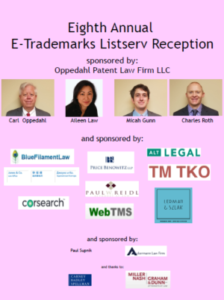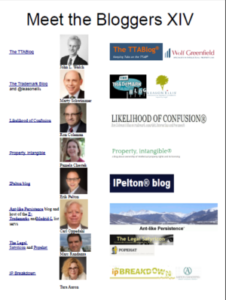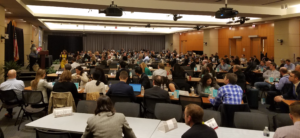Some weeks ago I posted most of the slides for Design Day 2018. Just now I received the last couple of slide decks — State of Technology Center 2900 and the Scientific Games presentations. You can see them all here.
Two receptions this week in Seattle!


As a reminder you are invited to two receptions this week in Seattle! Continue reading “Two receptions this week in Seattle!”
Monday: ten kinds of beer!
Hopefully you are planning to attend the E-Trademarks Listserv reception this coming Monday evening, May 21 in Seattle. This will be at the Gordon Biersch Brewery Restaurant. For more information, or to RSVP, click here.
I stopped by the brewery today and they gave me their list of beers that will be on tap for the reception. You can see the detailed list here, and this is a simplified list:
- Traditional German Biers
- Golden Export – Dortmunder Lager – light and refreshing
- Marzen – Oktoberfest – malty and roasted
- Czech Pilsner – Bohemian pilsner – hoppy
- Hefewizen – German wheat bier – fruity and spicy
- Modern American Craft and other styles
- Maibock – German-style lager – malty and strong
- Belgian pale ale – belgian ale – fruity and spicy
- Mexi-lager – lager – light and refreshing
- Belgian IPA – Belgo-style ale – fruity and hoppy
- The Beast Imperial IPA – India pale ale – hoppy and strong
- Imperial Stout – stout – dark
Time to register for the PCT Seminar in Colorado (June 13-15)
It’s time to register for this PCT Seminar which will take place June 13-15 in Westminster, Colorado. One reason to register now is that the hotel guest room block will be available only until May 22. Another reason to register now is that coupon code “blog18”, which gives you an extra $100 off the registration price, expires May 22.
Still another reason to make plans now, if you will be flying to Colorado for the Seminar, is that you will want to make your air travel reservations. Probably you would want to arrive at least as early as June 12.
If you’re on the fence and have not yet decided whether or not to attend the Seminar, I invite you to take a look at these handwritten comments from people who attended a recent Seminar that I presented.
A design electronic priority document experiment to try
At the present moment the number of Offices participating in DAS as depositing Offices is quite small. So far as I am aware the list of design depositing Offices is limited to China, Spain, and India. But a little-known feature of DAS permits design practitioners to be really smart about electronic certified copies. Continue reading “A design electronic priority document experiment to try”
DAS membership and participation developments
It has been announced that on June 1, 2018, the Netherlands Patent Office will join the DAS system. This is of course welcome news, and this will bring the number of DAS participating Offices to 18.
Among the IP5, conspicuously absent from DAS is the European Patent Office. EPO has promised that it will join DAS by late 2018.
Among the ID5, conspicuously absent from DAS is the European Union Intellectual Property Office. It is hoped that EUIPO will join DAS soon.
With regard to the USPTO, the PDX system provides some of the same functions as DAS. If between some pair of Offices (for example US and CN or US and KR) there is both a PDX relationship and a DAS relationship, the PDX relationship trumps. As between DAS and PDX, DAS is to be preferred. It permits more effective troubleshooting by the practitioner and it is more secure. Thus it is hoped that USPTO will soon pull the plug on its PDX relationships with CN and KR, thus permitting DAS to be employed instead.
It is hoped that more and more Offices will participate in DAS with respect to design applications. USPTO has indicated that it will commence participation in DAS as a depositing Office for designs Real Soon Now.
Comprehensive live in-person PCT Seminar in Colorado
Attend a 2½-day live in-person Patent Cooperation Treaty seminar in Colorado, made possible with generous support from the World Intellectual Property Organization (WIPO). Book by May 22 to get this $699 registration price. To find out more, or to register, click here.
Readers of this blog are invited to use coupon code “blog18” to get an extra $100 off the registration price. Please note that this coupon expires May 22.
Industrial Designs and Detroit test cars

I live in aptly named Summit Country, Colorado at an altitude of about 9000 feet (about 2750 meters) above sea level. (The photograph at the top of this blog page shows some of the mountains where I live, including two “fourteeners“, Grays Peak, which I have climbed, and Torreys Peak.) The point of this blog article is that every year, about twice a year, a swarm of several dozen Detroit test cars arrives in Summit County. This spring’s swarm of Detroit test cars has arrived, and this photograph shows one of them. Continue reading “Industrial Designs and Detroit test cars”
Design Day 2018 was a success!

Design Day 2018 took place as scheduled on April 25, 2018 in the Madison auditorium (with remote events at regional patent offices). Here you can see a portion of the audience. The room was packed.
The program, which you can see here, was excellent. Here are most of the slide presentations:
-
- State of the Technology Center – Karen Young
- Beyond the USPTO: Design Developments Across the Globe – Courtney Stopp
- Prosecution Practices Panel
- Report from the Front Lines: Patent Office Proceedings – George Raynal
- Federal Circuit Year in Review – Alexis Simpson
- Protecting Designs – Michael Blankstein (Scientific Games)
- Report from the Front Line: US District Courts – Dunstan Barnes
Webinar: learn about PDX and DAS
I will be teaching a webinar on Tuesday, May 8 about PDX and DAS. Attend this webinar to learn about PDX and DAS or to reinforce what you already know. This program will be of interest to anyone who works on inbound or outbound filings, whether Paris-based or PCT-based or Hague Agreement-based.
To learn more, or to register, click here.
